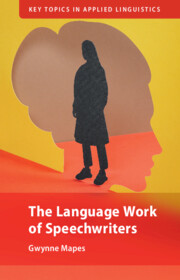Book contents
- The Language Work of Speechwriters
- Key topics in applied linguistics
- The Language Work of Speechwriters
- Copyright page
- Dedication
- Contents
- Figures
- Tables
- Acknowledgments
- 1 Introduction
- 2 Parameters of Professionalism
- 3 Invisibility, Materiality, and Erasure
- 4 Craft, Creativity, and Distinction
- 5 Virtue, Transgression, and Value
- 6 Reappraising Language Work
- Book part
- Glossary
- References
- Index
3 - Invisibility, Materiality, and Erasure
Published online by Cambridge University Press: 31 October 2025
- The Language Work of Speechwriters
- Key topics in applied linguistics
- The Language Work of Speechwriters
- Copyright page
- Dedication
- Contents
- Figures
- Tables
- Acknowledgments
- 1 Introduction
- 2 Parameters of Professionalism
- 3 Invisibility, Materiality, and Erasure
- 4 Craft, Creativity, and Distinction
- 5 Virtue, Transgression, and Value
- 6 Reappraising Language Work
- Book part
- Glossary
- References
- Index
Summary
Chapter 3 focuses on the notion of invisibility by tracking the life of a political speech from assignment to delivery. Mapes’ theoretical framework for this analysis comprises three interrelated concepts: language materiality (Shankar and Cavanaugh 2012), or the ways in which language and material objects are complicatedly entwined and consequently a matter of political economy; text trajectories (e.g. Lillis 2008), as in the processes that facilitate a text’s evolution; and entextualization (Bauman and Briggs 1990), the de- and recontextualization of language. Following Macgilchist and Van Hout’s (2011) ethnographic approach to documenting text trajectories, the analysis is divided into three case studies which together demonstrate speechwriters’ strategic and material erasure throughout the evolution of their deliverables. Ultimately, Mapes concludes by arguing that this ethnographic text trajectory evidence is another indication of the ways in which language workers must discursively enact Urciuoli’s (2008) “new worker-self” in order to claim status and success as wordsmiths.
Keywords
Information
- Type
- Chapter
- Information
- The Language Work of Speechwriters , pp. 72 - 107Publisher: Cambridge University PressPrint publication year: 2025
Accessibility standard: WCAG 2.1 AA
Why this information is here
This section outlines the accessibility features of this content - including support for screen readers, full keyboard navigation and high-contrast display options. This may not be relevant for you.Accessibility Information
Content Navigation
Allows you to navigate directly to chapters, sections, or non‐text items through a linked table of contents, reducing the need for extensive scrolling.
Provides an interactive index, letting you go straight to where a term or subject appears in the text without manual searching.
Reading Order & Textual Equivalents
You will encounter all content (including footnotes, captions, etc.) in a clear, sequential flow, making it easier to follow with assistive tools like screen readers.
You get concise descriptions (for images, charts, or media clips), ensuring you do not miss crucial information when visual or audio elements are not accessible.
Visual Accessibility
You will still understand key ideas or prompts without relying solely on colour, which is especially helpful if you have colour vision deficiencies.
Structural and Technical Features
You gain clarity from ARIA (Accessible Rich Internet Applications) roles and attributes, as they help assistive technologies interpret how each part of the content functions.
